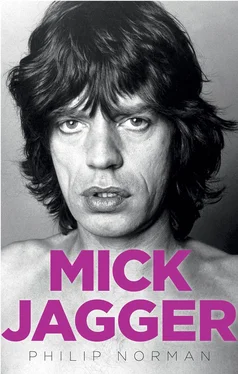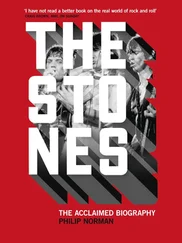Building up a repertoire was a laborious process. The usual way was for Mike and Dick to bring a record back from London, and the four to listen to it over and over until Bob had mastered the guitar fills and Mike learned the words. They did not restrict themselves to blues, but also experimented with white rock and pop songs, like Buddy Holly’s, which had some kinship with it. One of the better performances committed to the Philips Joystick was of ‘La Bamba’, whose sixteen-year-old singer–composer Ritchie Valens had died in the same plane crash that killed Holly in February 1959. Its Latino nonsense words being impossible to decipher, no matter how often one replayed the record, Mike simply invented his own.
The Joystick’s inventory dramatically improved with their discovery of harder-edged electric blues, as played by John Lee Hooker, Lightnin’ Hopkins, Memphis Slim and Howlin’ Wolf. A discovery of almost equal momentousness was that many of these alluring names could be traced to the same source, the Chess record label of Chicago. Founded in the 1940s by two Polish immigrant brothers, Leonard and Phil Chess, the label had started out with jazz but become increasingly dominated by what was then called ‘race’ music – i.e., for exclusively black consumption. Its most notable early acquisition had been McKinley Morganfield, aka Muddy Waters, born in 1913 (the same year as Joe Jagger) and known as ‘the father of the Chicago Blues’ for tracks like ‘Hoochie Coochie Man’, ‘I Just Want to Make Love to You’ and his theme song, ‘Rollin’ Stone’. His album At Newport 1960 , capturing his performance at the 1960 Newport Jazz Festival, was the first album Mike Jagger ever bought.
In 1955, Chess signed St. Louis-born Charles Edward Anderson – aka Chuck – Berry, a singer-songwriter-guitarist who combined the sexiness and cockiness of R&B with the social commentary of country and western, the lucid diction of black balladeers like Nat ‘King’ Cole and Billy Eckstine, and a lyrical and instrumental nimbleness all his own. Soon afterwards Berry made an effortless crossover from ‘race’ music to white rock ’n’ roll with compositions such as ‘Johnny B. Goode’, ‘Sweet Little Sixteen’ and ‘Memphis, Tennessee’ that were to become its defining anthems. Long before he ever heard a Chuck Berry song, Mike’s voice had some of the same character.
After a long and fruitless search for Chess LPs up and down Charing Cross Road, he discovered they could be obtained by mail order directly from the company’s Chicago headquarters. It was a gamble, since prepayment had to be enclosed and he had no idea whether he’d like the titles he ordered – if they ever materialised at all. But, after a lengthy wait, flat brown cardboard packages with American stamps began arriving at ‘Newlands’. Some of the covers had been badly chewed up in transit and not all the music lived up to his expectations. But the albums in themselves were splendiferous status symbols. He took to carrying around three or four at once tucked under one arm, a fashion accessory as much as his gold-flecked jacket and moccasins. Alan Dow, who’d rejected him as a vocalist for Danny Rogers and the Realms, witnessed one such almost regal progress across the school playground.
In summer 1961, he sat his A-level exams, passing in English and history but, surprisingly, failing in French. He considered becoming a schoolteacher in his father’s – and grandfather’s – footsteps, and toyed with the idea of journalism and (unmentionably to his parents) disc-jockeying on Radio Luxembourg. Leafing through the pop music papers one week, he spotted an advertisement by a London record producer named Joe Meek, inviting would-be deejays to submit audition tapes. He clipped the ad and kept it, but – perhaps fortunately – didn’t follow it up. Meek later produced several British pop classics, all from his small north London flat, but was notorious for trying to seduce the prettier young men who crossed his path.
Instead, somewhat against expectations, Mike Jagger joined the 2 per cent of Britain’s school leavers in that era who went on to university. Despite those clashes over uniform, his headmaster, Lofty Hudson, decided he was worthy of the privilege and, in December 1960, well before he had sat his A-levels, supplied a character reference putting the best possible gloss on his academic record. ‘Jagger is a lad of good general character,’ it read in part, ‘although he has been rather slow to mature. The pleasing quality which is now emerging is that of persistence when he makes up his mind to tackle something. His interests are wide. He has been a member of several School Societies and is prominent in Games, being Secretary of our Basketball Club, a member of our First Cricket Eleven and he plays Rugby Football for his House. Out of school he is interested in Camping, Climbing, Canoeing, Music and is a member of the Local Historical Association . . . Jagger’s development now fully justifies me in recommending him for a Degree course and I hope you will be able to accept him.’
Though in no sense hyperbolic, the head’s letter did the trick. Conditional on two A-level passes, Mike was offered a place at the London School of Economics to begin reading for a BSc degree in the autumn of 1961. He accepted it, albeit without great enthusiasm. ‘I wanted to do arts, but thought I ought to do science,’ he would remember. ‘Economics seemed about halfway in between.’
At that time, Britain’s university entrants were not forced to run themselves into debt to the government to pay for their tuition, but received virtually automatic grants from local education authorities. Kent County Council gave Mike £350 per annum, which at a time of almost zero inflation was more than enough to cover three years of study, especially as he would continue living at home and travel up each day by train to the LSE’s small campus in Houghton Street, off Kings-way. Even so, it was clearly advisable to earn some money during the long summer holiday between leaving school and starting there. His choice of job sheds interesting light on a character always thought to have been consumed by selfishness, revealing that until his late teens at least he had a caring and altruistic side that made him very much his father’s son.
For several weeks that summer, he worked as a porter at a local psychiatric institution. Not Stone House – that would have been too perfect – but Bexley Hospital, a similarly grim and sprawling Victorian edifice locally nicknamed ‘the Village on the Heath’ because until recently, in the interests of total segregation, its grounds had included a fully functioning farm. He earned £4.50 per week, not at all a bad wage for the time, though he clearly could have chosen an easier job, both physically and emotionally. He was to be remembered by patients and staff alike as unfailingly kind and cheerful. He himself believed the experience taught him lessons about human psychology that were to prove invaluable throughout his life.
It was at Bexley Hospital, too, by his own account, that he lost his virginity to a nurse, huddled in a store cupboard during a brief respite from pushing trolleys and taking round meals: the furthest possible extreme from all those luxury hotel suites of the future.
A STUDENT AT the London School of Economics in 1961 enjoyed a prestige only slightly below that of Oxford or Cambridge. Founded by George Bernard Shaw and the Fabians Beatrice and Sidney Webb, it was an autonomous unit of London University whose past lecturers had included the philosopher and pacifist Bertrand Russell and the economist John Maynard Keynes. Among its many celebrated alumni were the Labour chancellor of the exchequer Hugh Dalton, the polemical journalist Bernard Levin, the newly elected president of the United States, John F. Kennedy, and his brother (and attorney general) Robert.
Читать дальше












